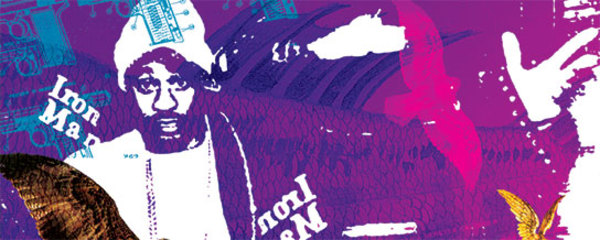Ghostface: Ghetting Ghost
It’s been about a decade since the Wu-Tang’s most shadowy warrior revealed his face, turning […]
Ghostface: Ghetting Ghost
It’s been about a decade since the Wu-Tang’s most shadowy warrior revealed his face, turning […]

It’s been about a decade since the Wu-Tang’s most shadowy warrior revealed his face, turning Raekwon’s Only Built 4 Cuban Linx into a surreal, coke deal-fueled coming out party before staking his claim as the Clan’s rawest talent on his solo debut, Ironman. A half-decade later-with hip-hop in a slump and an inventive major label rap record seeming as plausible as Ralph Nader for president-Ghost made the new millennium’s first ghetto classic: Supreme Clientele.
Sure, 2002’s Bulletproof Wallets was somewhat of a misstep and last year’s Pretty Toney, while one of the year’s best albums in any genre, has been cited as more of a commercial disappointment then a classic. But as other rappers of his age group and epoch have settled into retirement or followed trends set by the younger generation, no one rips through 16 bars these days with more hunger than the Wallabee-wearing chairman of Starks Enterprises. Perennially toeing the line between savant-like enlightenment and seeming absurdity, often shifting on a dime from poignant and poetic to hateful and overly simplistic, his patented torrent of observations and emotions continues to set the standard for freeform lyrical dexterity.
“I’m just being Ghost,” a low-key Killah says inside the basement at Manhattan’s S.O.B.’s, where he’s about to perform with Theodore Unit, a crew from his hometown of Stapleton in Staten Island with whom he made last year’s 718 (An album with Theodore Unit crewmember Trife da God, called 718: From Stapleton to Somalia, was released in October). A black baseball hat low on his head and a golden basketball sneaker dangling from his neck, Ghost-who stands about 6′ 4″ with broad, fullback-like shoulders-is one of a few larger-than-life rappers who actually appear bigger in person than they do on TV or in magazines. “Not a lot of artists these days (are) comfortable with doing themselves so they go out and do what they think they supposed to do, but they ain’t doing nothing, really. I’m fittin’ to take things back to the promise land with this next record, though.”
That would be Fish Scale, his fifth LP and second since signing with Def Jam. Titled after an expensive strain of impossibly hardened cocaine-the insides of which, when cut open, resemble the scales of a fish-Fish Scale is, as Ghost says, “the rawest, hardest shit that be out on the streets.”
“I don’t like to sit on the same shit-I like to move around a lot,” says the man born Dennis Coles. “That’s why I let them niggas keep that block shit. I could have stayed talking on slinging crack like all these other cats but I’ve been done that since heaven and hell, nahmean? I’m taking care of babies in Africa. I got families that I look after there. But I had to take it back to that other shit here ’cause niggas respect violence.”
Things look promising. Not only does Ghost, perennially hindered by failed sample clearance and improper promotion, have an invaluable front office ally in new Def Jam president Jay-Z, but he’s brought MF Doom and Pete Rock (who crafted lead single “Be Easy”) on to produce much of the album and capture the classic soul samples that are his calling card.
“That’s where I get my shit from, that old soul music,” says Ghost, whose live show often finds him just singing along to records from artists like Curtis Mayfield. In a similar vein, the self-produced Pretty Tony highlight “Holla” found him rhyming over The Delfonics’ “La La (Means I Love You)”-not a loop, but the entire track. It was a bold, bizarre and somewhat lazy move that proved to be a stroke of irresistible genius. “People who don’t got no soul don’t understand when I do something like that,” Ghost says. “I prefer that shit to hip-hop any day. That’s the nucleus of all this.”
Reached at his home in Atlanta by phone, MF Doom provides some insight into his recent studio activity with the Ironman. “It is bonkers when I tell you!” Doom says with an enthusiasm rarely heard from such a grizzled veteran. “He’s coming with what needs to be heard right now, information-wise, style-wise. He could rhyme to the sound of traffic or tapping on a table but I gave him some tunes like ”Damn, what would he do on that beat?” and he flipped it in a way that made me want to run back and get on it.”
While Metal Face doesn’t rhyme on Fish Scale, both he and Ghostface promise to match flows on an as yet untitled LP, for which several tracks have already been recorded. “It was bound to happen,” says Doom. “It was almost like a cousin that you’ve heard about but you didn’t meet yet, but you can tell that it’s your aunt’s son. Wu-Tang breathing new life into the game is what brought me back out. Actually, when Starks came out as Ironman that kinda made me mad. I already had the Doom concept so I was like ‘Damn, he beat me to the punch.’ It worked out, though.”
For fans of free-form lyricism and cinematic hip-hop soundscapes, the Doom-meets-Ghost pairing will undoubtedly be a match made in heaven. But even though both draw from a comics- and cartoon-obsessed childhood and a sponge-like absorption of pop culture, don’t expect a corny concept album.
“I just write to the beat,” Ghost summarizes. “Sometimes I wouldn’t have even thought about something before I went into that studio but the beat just brings something out of me. That’s why I pick my beats so carefully. It’s like picking a woman. It’s personal.”

